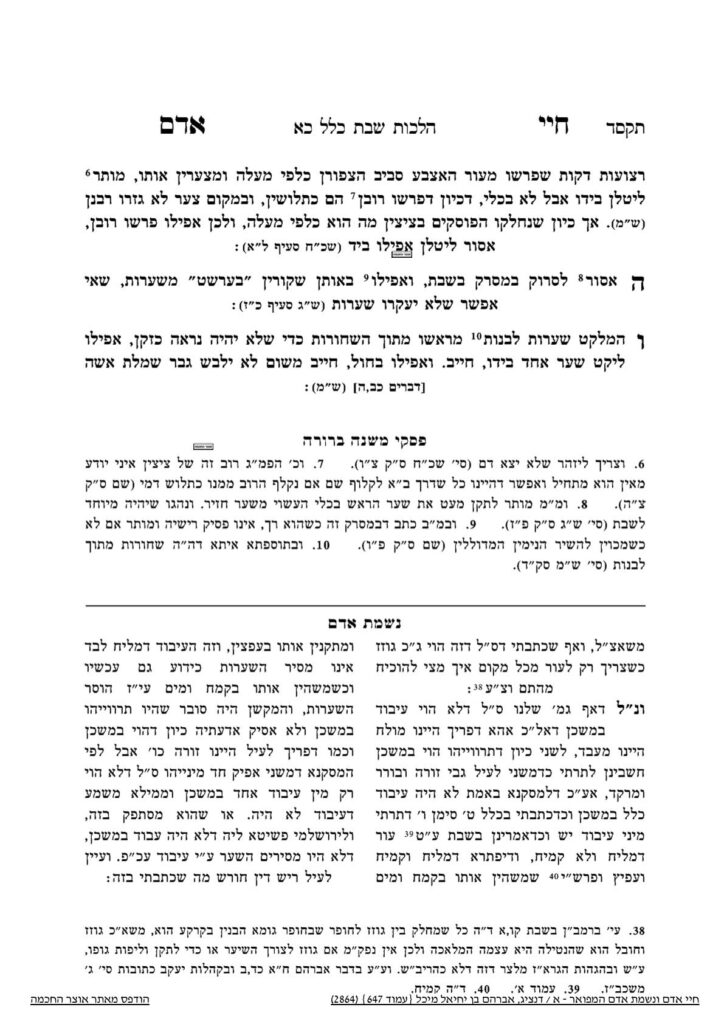We have finished siman 5, where we learned about the issur of combing hair on Shabbos. We learned that according to the Rivash, combing is possibly considered mechavein, since the purpose of combing is to straighten out the hair, which requires the removal of the semi-attached hairs.On the other hand, we learned that combing can possibly be considered only a psik reisha, since a person is not actively trying to tear out hair, even though it may be inevitable. If it is considered a psik reisha, we would further differentiate between a psik reisha d’nicha lei, which is assur mideoraysa, and a psik reisha d’lo nicha lei, which the Aruch holds is muttar and Tosfos holds is assur miderabanan. We also discussed the melacha she’eina tzricha legufah aspect as well, since the purpose of combing is not for the hairs which are removed.
If we consider combing to be a melacha she’eina tzricha legufah, if a woman forgot to comb her hair before Shabbos and needs to go to the mikvah, the question is whether she can ask a non-Jew. When it came to cutting nails, we learned that if it is considered a shvus d’shvus b’makom mitzvah, it will be muttar to instruct a non-Jew. We mentioned that that is debatable.
However, over here, the instruction to the non-Jew would be to comb hair. Combing hair is not inherently a melacha, but can result in a psik reisha (detaching hair). This leads us to revisit the question of whether there is an issur of amira l’achum on a psik reisha (see shiur s551). The Mishnah Berurah paskens that there is no issur of amira l’achum on a psik reisha.
There are two explanations given as to why there is no issur of amira l’achum on a psik reisha. The Mishnah Berurah explains that although psik reisha has the halachic equivalent of mechavein (intent), practically, it is not something the non-Jew was mechavein to perform. In other words, psik reisha means that the non-Jew will have intention for one action, and, although another action will inevitably result, the non-Jew had no intention for the second action, so it may be halachically classified along with the first action, but it is still not the action the non-Jew intended to perform. Therefore, it is a lesser level of aveira, and the issur of amira l’achum doesn’t apply to it.
The Aruch Hashulchan gives another explanation. The concept of amira l’achum is based on shlichus, that the Jew makes the non-Jew a proxy. Mideoraysa, there is no concept of shlichus for a non-Jew; it can only have effect if the proxy is a Jew. Miderabanan, Chazal gave the non-Jew the status of shliach regarding Shabbos. However, it only applies when the Jew made the non-Jew a proxy on that action. Over here, the Jew asked the non-Jew to be a shliach to comb, not to tear out hair, and the shlichus is limited to the instructions the Jew gave the non-Jew. Therefore, there is no issur of amira l’achum on a psik reisha.
Going back to the Rivash, if one accepts the argument that combing hair is considered as though one is intentionally pulling out hair, asking the non-Jew to comb hair is considered mechavein as well, and will be assur because of amira l’achum. If one accepts the other opinion, that it is a davar she’eina miskavein, it would explain why even when it is a psik reisha, it is muttar to ask the non-Jew. In this halacha, it is not necessary to rely on shvus d’shvus b’makom mitzvah, since there is no longer an issur on the amira. Many poskim assume the latter argument, including Rav Ovadia.
Thus, in regards to the question of a woman who forgot to comb her hair before Shabbos and needs to go to the mikvah on Friday Night, she can directly ask a non-Jew to comb her hair.
Summary
If a woman forgot to comb out her hair before Shabbos and needs to go to the mikvah, she can ask a non-Jew to comb it. Although it is assumed a psik reisha that the non-Jew will tear out hair, there is no issur of amira l’achum on a psik reisha.



